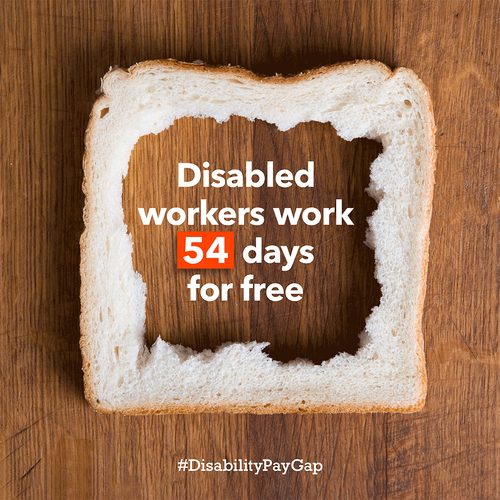NUJ Disabled Members’ Council calls for action to address the disability pay gap
Thursday 7 November is ‘Disability Pay Gap Day’, the day when the average disabled person stops getting paid compared to the average non-disabled person.
The latest analysis from the TUC shows that non-disabled workers earn 17.2 per cent more than disabled workers, a staggering £4,300 per year difference. Disabled people also face higher living costs of around £1,010 more per month than non-disabled people.
The NUJ Disabled Members Council joins the wider trade union movement in welcoming government proposals for mandatory disability pay gap reporting and calls on employers to take action to address under-representation of disabled journalists.
Natasha Hirst, NUJ president and disabled members’ rep, said:
"Disabled workers, including disabled journalists, experience multiple barriers at work. The disability pay gap is a clear indicator that disabled people are losing out on pay as well as opportunities to progress their careers. The proposals for mandatory disability pay gap reporting are important to push employers to take effective action towards disability equality at work."
Ann Galpin, chair of the NUJ Disabled Members’ Disabled Council, said:
"We encourage journalists to take a nuanced view and scrutinise government rhetoric when reporting on disability issues and social security.
"As a union, we’d welcome more robust data on the differences among disabled freelances as disabled members are proportionally more likely to be self-employed. Freelances in the creative industries and journalism experience precarity of work and income and lack of sick pay. Inadequate social security support, such as universal credit makes managing fluctuating income especially hard and increases income inequality."

Events and support for members
Webinar: Negotiating for Reasonable Adjustments - 27 November 2pm
Reasonable adjustments are changes an employer makes to remove or reduce a disadvantage related to a disabled worker’s impairment or health condition. But what is defined as ‘reasonable’ and what else should union reps know? TUC Disability History Month webinar on what reps and disabled workers need to know about negotiating for reasonable adjustments. Sign up now by registering here https://www.tuc.org.uk/events/webinar-negotiating-reasonable-adjustments
The NUJ Disabled Members Council and Ethics Council are holding a ‘reporting disability’ webinar on the 9 December from 6-7pm. Book your free place here: https://www.nuj.org.uk/learn/ems-event-calendar/reporting-on-disability.html
The NUJ Disabled Members Council is holding our next informal session online in January to give disabled members a chance to hear an update from the council and answer any questions.
NUJ members who are experiencing difficulties securing reasonable adjustments, or are concerned about discrimination or unfair treatment at work should contact a workplace rep or a union official – contact details available via the website.
If you identify as disabled or have a health condition, please update your membership profile via the website login so we can keep you updated with news for our disabled members. If your circumstances have changed and your income has dropped, contact the membership department [email protected] to find out if you are eligible for a reduction in subs.
NUJ Extra is also available for members experiencing financial hardship.
Read the in-depth 2019 TUC report on disability employment and pay gaps.
